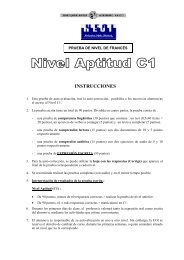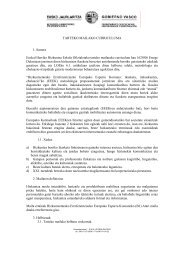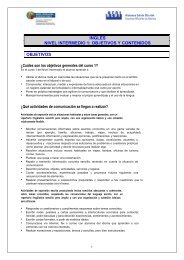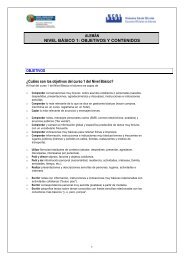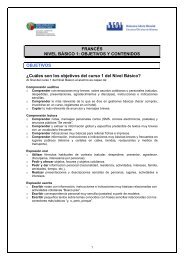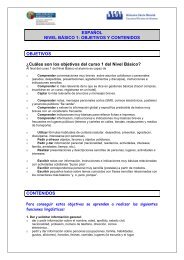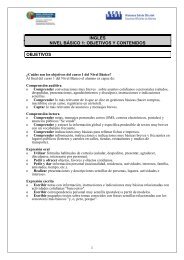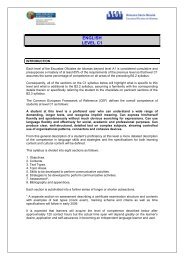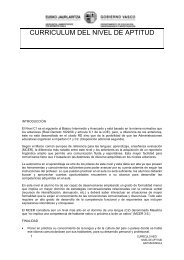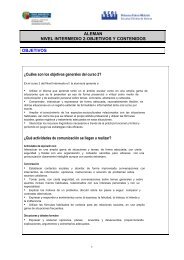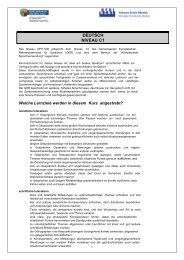Maila Aurreratuko Kurrikulua (B2.1 eta B2.2)
Maila Aurreratuko Kurrikulua (B2.1 eta B2.2)
Maila Aurreratuko Kurrikulua (B2.1 eta B2.2)
You also want an ePaper? Increase the reach of your titles
YUMPU automatically turns print PDFs into web optimized ePapers that Google loves.
o Gertakari bat egunerokoa denean, <strong>eta</strong>, ondorioz, etorkizunean ere gertatuko dela ziur<br />
gaudenean, will/won’t + aditza + -ing erabiltzen dugu (They’ll be paying us their monthly<br />
visit tomorrow, so I’ll show them our new project then).<br />
o Geroaldiko esanahia duten esamoldeak: etorkizunerako antolatutako gertaerez hitz<br />
egiteko, be to + infinitive (The President is to give a speech at the beginning of the<br />
ceremony).<br />
o Antolatutako gertaerez hitz egiteko, due to + infinitive (The last book of the series is due<br />
to be released in October).<br />
o Etorkizun hurbilean/berehalakoan gertatuko dela uste den gertakizun bati buruz hitz<br />
egiteko, honako hauek erabiltzen dira: be about to (Hurry up! The train is about to<br />
leave!), edota on the point of/on the verge of (She is on the point of having a nervous<br />
breakdown).<br />
o Probabilitatea <strong>eta</strong> ziurtasuna adierazteko, be(un)likely / bound / sure to + infinitive<br />
erabiltzen da (He’s unlikely to win the election).<br />
o Geroaldiko esanahia duten aditzak:<br />
verb + to + infinitive: decide, hope, intend, promise, swear (I swear never to<br />
reveal any of the secrets).<br />
verb + noun/-ing form: anticipate, predict, foresee (We anticipate congestion on<br />
all major roads).<br />
verb + (noun) + to + infinitive: arrange, expect, guarantee, undertake (We are<br />
planning a long stay to improve our English).<br />
o Zenbait moduzko aditz errepasatuko ditugu <strong>eta</strong> haiei buruz gehiago ikasiko dugu: hain zuzen ere,<br />
treb<strong>eta</strong>suna, aukera, planak, baimena, betebeharra, beharra, betebehar edo beharrik eza, debekua,<br />
ziurtasuna <strong>eta</strong> ohiturak adierazteko balio duten moduzko aditzak. Honako funtzio hau<strong>eta</strong>n<br />
sakonduko dugu: purrustada, aholku edo gomendioak, dedukzio logikoa, probabilitatea orainean<br />
<strong>eta</strong> iraganean, <strong>eta</strong> nahi hipotetikoak.<br />
o Subjuntiboaren erabilera:<br />
o Forma <strong>eta</strong> erabilerari buruz ikasitakoa errepasatu <strong>eta</strong> areagotuko dugu.<br />
o Subjuntiboa ez den beste zerbait erabiltzeko aukerak:<br />
Erregistro neutroan: should + infinitive (It is vital that every applicant should<br />
complete the form in triplicate); for + subject + to + infinitive (It is vital for every<br />
applicant to complete the form in triplicate).<br />
Erregistro informalean: present/past simple (It is vital that every applicant<br />
completes the form in triplicate; They demanded that he left).<br />
o Lehenaldi “irreala”ren erabilera finkatuko dugu: wish/if only + past simple, wish/if only +<br />
past perfect, wish/if only + would, wish/if only + could (have).<br />
o Esamolde finko<strong>eta</strong>n duen erabilera (Long live the republic!; Be that as it may; Come what<br />
may).<br />
o Agindu<strong>eta</strong>n: you + Vp infinitive (John, you be a good boy and eat your spinach!).<br />
o Pasiboaz ikasitakoa errepasatu <strong>eta</strong> areagotuko dugu:<br />
o Boz pasibo inpertsonala: subjektua + aditza pasiboan + to + infinitive (He was said to be<br />
innocent); it + aditza pasiboan + that clause (It’s said that he has commited suicide).<br />
o Partikula duten aditzak/multi-word verbs finkatuko ditugu (The company was taken over).<br />
o Aditz preposizional iragangaitzen egitura pasiboa (He was laughed at).<br />
o Infinitiboa egitura pasibo<strong>eta</strong>n (To be given the role of Hamlet was his greatest ambition).<br />
o Balio arazlea duten aditzen berrikuspena: have/get + objektua + lehenaldiko partizipioa<br />
(Have/get that mess cleaned up at once!).<br />
o Nahastea sortzen duten aditzak nola erabili aztertuko dugu: lay / lie, raise / rise, rob / steal.<br />
Aditzaren osagarriak<br />
87<br />
CURRÍCULO HEOI<br />
NIVEL AVANZADO<br />
MAILA AURRERATUA



